Publications
The report, authored by Christine Lottje and Lilia Maximova, both FAKT Consult, with co-authors Anika Terton and Jeffrey Qi from the International Institute for Sustainable Development, IISD, was launched by GIZ and the NBSAP Accelerator Partnership. It explores the strong link between the Paris Agreement and the Kunming–Montreal Global Biodiversity Framework, emphasizing their mutual dependence. National strategies (NBSAPs and NDCs) are a key to aligning climate and biodiversity goals. Drawing on 10 country case studies, the report highlights how integrated planning can create synergies and co-benefits. It offers practical insights for policymakers, civil society, and Indigenous Peoples.


This film, produced by FAKT and the Kenya Rainwater Association with funding from Bread for the World and the Ministry of Economic Affairs of the State of Baden-Württemberg, Germany, tells a powerful story of cross-border learning and women’s empowerment. It follows a group of Ugandan women who travelled to Kenya to learn practical rainwater harvesting techniques from experienced women’s groups in the Laikipia District.
The film was realized by Alwan Communications, Nairobi, and is available in Swahili, English, French, and German.


In 2024, Ms Susanne Frieß (FAKT Consult) carrried out an analysis on behalf of Brot für die Welt of the interrelation between land rights and climate change, especially concerning the question of how land-based climate action increases the pressure on land and threatens the land rights of indigenous peoples (IPs) and local communities (LCs).

In 2024, Ms Susanne Frieß (FAKT Consult) elaborated an analysis on behalf of Brot für die Welt of the interrelation between land rights and climate change, especially concerning the question of how land-based climate action increases the pressure on land and threatens the land rights of indigenous peoples (IPs) and local communities (LCs).
The report summarises the content shared in an online discourse on “Advocating for land rights in the context of climate change.” The webinar series was organised by Brot für die Welt. Representatives from 27 land rights organisations from Cambodia, Fiji, Indonesia, Laos, Myanmar, Papua New Guinea, Philippines, and Vietnam as well as staff members from Brot für die Welt participated in the online discourse.
The study also provides some basic information on the national climate pledges and the role of land for the achievement of national climate targets, and presents entry points for advocating for land rights of IPs and LCs in the context of climate change and equips the readers with further reading materials to deepen the knowledge on the issue.


On behalf of GIZ, Dr. Heidi Feldt and Susanne Frieß, FAKT, developed a publication on “Exploring the Remedy Gap in the Large-Scale Mining Sector – The Role of Grievance Mechanisms to promote Human Rights in Mineral Supply Chains”. The report evaluates non-state-based non-judicial grievance mechanisms (NSBNJ GMs) in the extractive sector, particularly their effectiveness in providing remedies for those affected by mining activities, in the light of the UN Guiding Principles on Business and Human Rights, and focusing on Colombia, Indonesia, Peru, and South Africa. The report also analyzes persisting barriers for rights holders to get access to adequate remedy, particularly in cases involving serious human rights allegations. Recommendations are provided for companies, civil society, and development cooperation and identifies the National Human Rights Institutes as key stakeholders that can play a crucial role in closing the remedy gap.
English publication:
- Executive summary: Exploring the Remedy Gap in the Large-Scale Mining Sector – The Role of Grievance Mechanisms to promote Human Rights in Mineral Supply Chains
- Final study: Exploring the Remedy Gap in the Large-Scale Mining Sector – The Role of Grievance Mechanisms to promote Human Rights in Mineral Supply Chains


FAKT was commissioned by GIZ’s Sector Project TVET and Labour Market to conduct a series of five studies on „Skills for a Just Transition to a Green Future“, all of which have now been published. The starting point is a discussion paper that outlines seven key policy and TVET-related points for qualifying the workforce for a Green Economy. Based on these assumptions, three sector-specific studies address the upcoming demand for skills for renewable energy, e-mobility and green construction in partner countries in the Global South. The final vision paper adds a political dimension to the discussion and emphasizes the role of TVET and development cooperation in the Green and Just Transition.
English publications:
- Discussion Paper: Skills for a Just Transition to a Green Future
- Sectoral Study: TVET for Renewable Energies
- Sectoral Study: TVET for Sustainable Construction
- Sectoral Study: TVET for Sustainable Mobility
- Vision Paper: What TVET can and must do in a Just Transition to a Green Economy
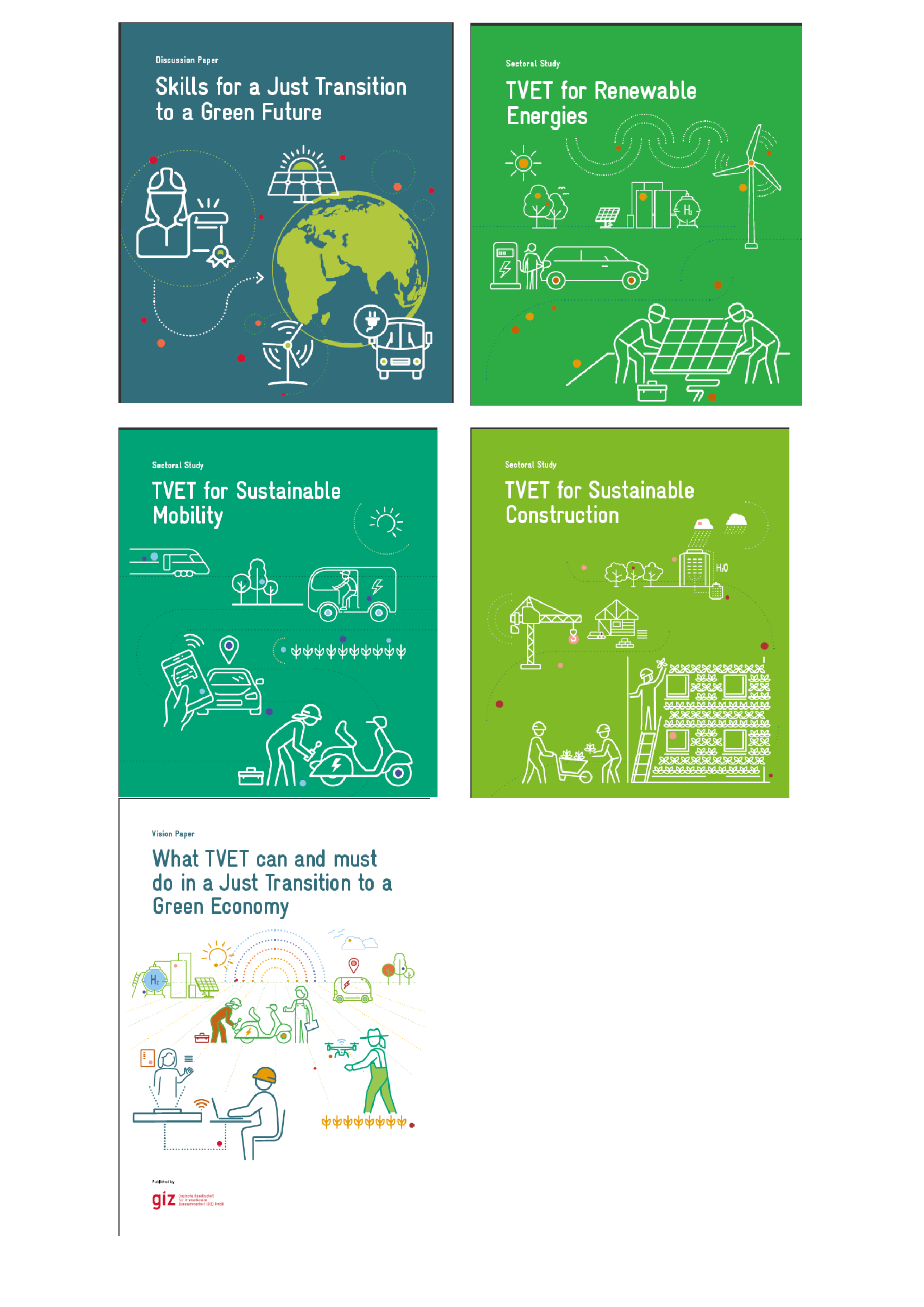

FAKT GmbH (Bernward Causemann, Regine Parkes) hat maßgeblich zum DeGEval-Arbeitspapier „Gütekriterien für Monitoring“ beigetragen. Das Papier bietet Monitoring-Praktikern Ideen und Denkanstöße für ein erfolgreiches Monitoring. Basierend auf einer umfassenden Literaturrecherche analysiert das Papier auf normativer Ebene, was erfolgreiches Monitoring tatsächlich ausmacht. Auf Grundlage der DeGEval-Standards für Evaluation wurden dabei 10 Gütekriterien entwickelt.
FAKT Consult (Bernward Causemann, Regine Parkes) contributed significantly to the DeGEval working paper “Gütekriterien für Monitoring”. The paper offers monitoring practitioners ideas and points of reflection for successful monitoring. Based on a comprehensive literature review, the paper analyses on a normative level what actually constitutes successful monitoring. 10 quality criteria (Gütekriterien) were developed on the basis of the DeGEval standards for evaluation.
German publication:
- Gütekrieterien für Monitoring in der Entwicklungszusammenarbeit
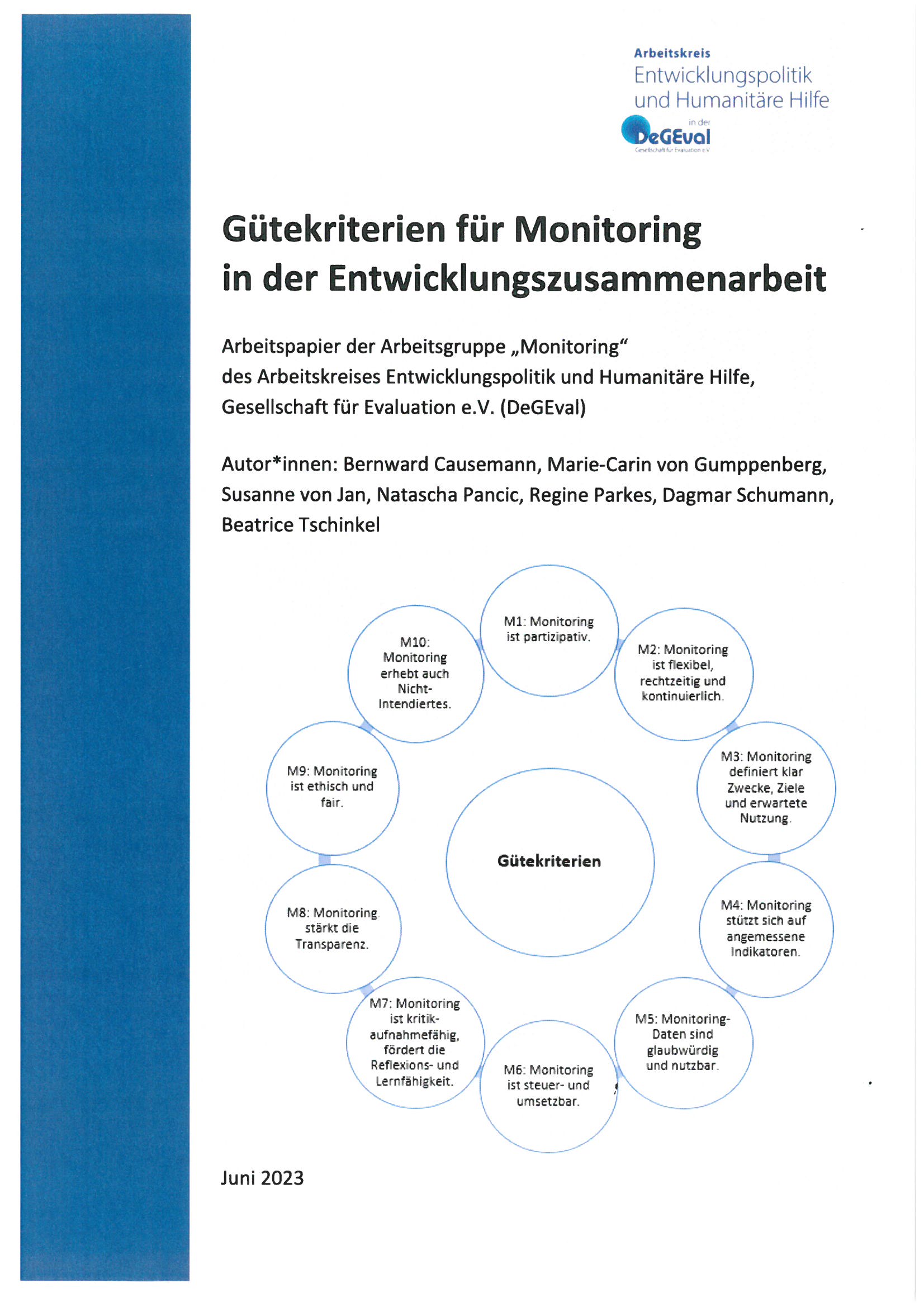

This factsheet gives an introduction into the rationale climate risk assessments (CRA), examples of selected tools and services that FAKT offers as well as an overview of key learnings for their implementation.
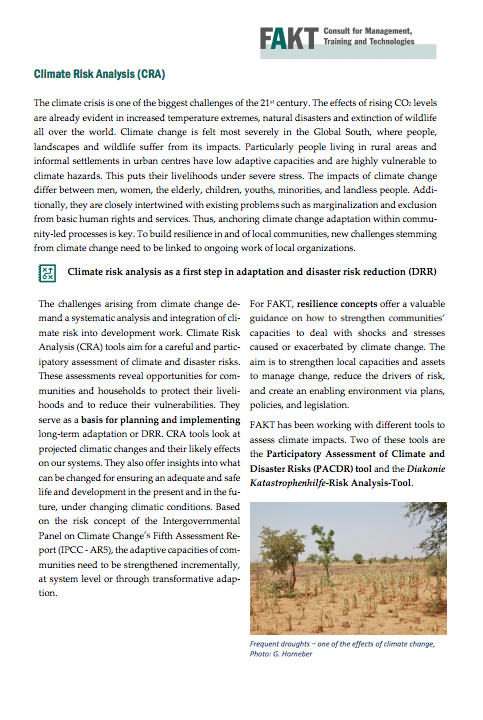

The Rapid Climate Risk Assessment is a tool that is designed to monitor climate change impacts systematically. The Southern African Development Community (SADC) Participatory Rapid Climate Risk Assessment (PRCA), developed in 2020 with support from the Deutsche Gesellschaft für Internationale Zusammenarbeit (GIZ), identified climate risk hotspots in the Malawi-Zambia (MaZA) Transfrontier Conservation Area (TFCA). The methodology combined a desk study, community assessments and virtual sessions with representatives of the MaZa TFCA management and with local authorities and grasps local knowledge, perceptions and contexts. In 2022, FAKT put the tool into action to inform the development of adaptation and mitigations plans for the region. You can learn more about the methodology from the project factsheet.
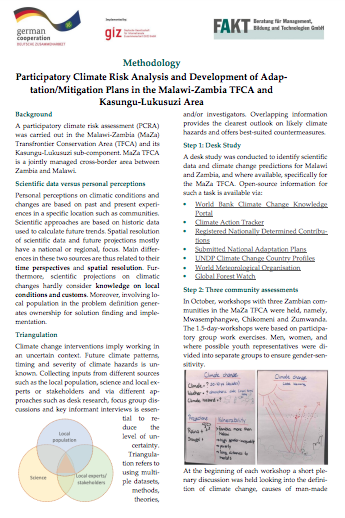

The GIZ Global Project ‘Mainstreaming EbA – strengthening ecosystem-based adaptation in planning and decision-making processes’ launched a collection of publications exploring climate justice aspects in EbA. FAKT Consult supported the Global Project on the topic of climate justice in EbA through identifying the gaps between theory and practice and developing tools and methodologies to contribute towards bridging these gaps.
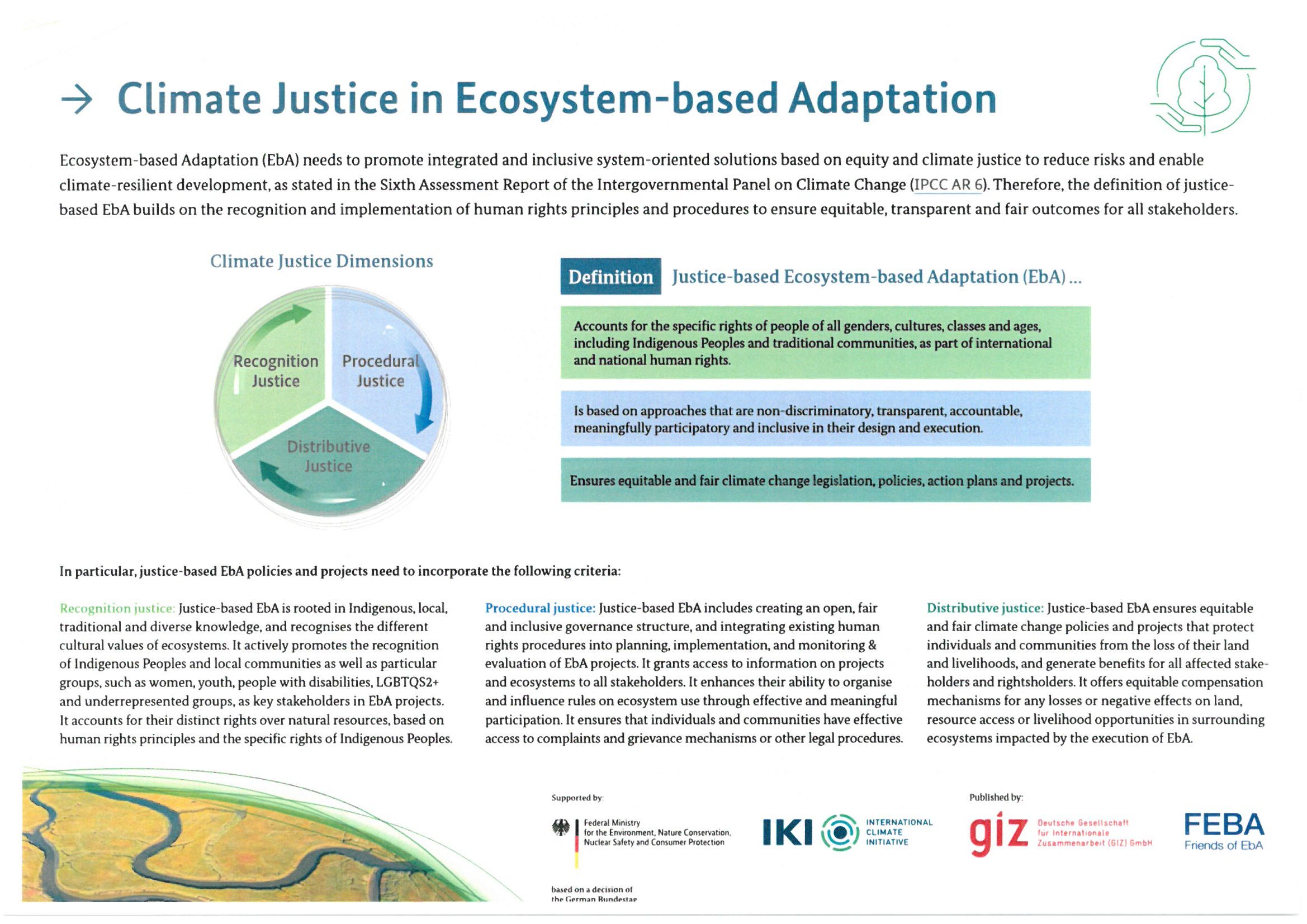
The Global Project supports actors at international, national and local level to incorporate Ecosystem-based Adaptation into policy and planning processes of different sectors. You can learn more about the project and FAKT’s contribution here
Overview of the publications
GIZ (2022) Defining Climate Justice in Ecosystem-based Adaptation. Deutsche Gesellschaft für Internationale Zusammenarbeit (GIZ) GmbH, Bonn, Germany.
This publication outlines the understanding of justice-based approaches in EbA and sums up the definition of climate justice adopted by the Friends of EbA (FEBA) network.
In English: https://www.adaptationcommunity.net/publications/defining-climate-justice-in-ecosystem-based-adaptation/
GIZ (2022) Climate Justice in Ecosystem-based Adaptation – A Policy Paper. Deutsche Gesellschaft für Internationale Zusammenarbeit (GIZ) GmbH, Bonn, Germany.
This publication gives an overview of justice challenges in EbA and outlines the international context. It highlights entry points for enhancing justice based EbA in project planning and implementation, the international climate and biodiversity finance system as well as in the national context.
GIZ (2022) Climate Justice in Ecosystem-based Adaptation – The case of Soc Trang coastal zone, Vietnam. Deutsche Gesellschaft für Internationale Zusammenarbeit (GIZ) GmbH, Bonn, Germany
This publication illustrates successful strategies for fostering justice based EbA implementation which strengthen the sustainability of disaster risk reduction (DRR) for marginalized Indigenous communities.
GIZ (2022) Climate Justice in Ecosystem-based Adaptation – The case of Indigenous municipalities in the province of la Mosquitia, Honduras. Deutsche Gesellschaft für Internationale Zusammenarbeit (GIZ) GmbH, Bonn, Germany.
This publication illustrates successful strategies for fostering justice based EbA implementation which strengthen the participation and ownership of Indigenous communities in a project working on the agricultural sector.
GIZ (2022) Guidance on Integrating Justice Issues into the Planning of Ecosystem-based Adaptation Interventions. Deutsche Gesellschaft für Internationale Zusammenarbeit (GIZ) GmbH, Bonn, Germany.
This publication provides practitioners and project planners with concrete entry points for anchoring justice in EbA project planning. It gives guidance on strategic frameworks, formulating project objectives and measures and anchoring justice in the institutional and financial setup. It also explains key steps how to best involve stakeholders in setting up the M&E system.
GIZ (2022) Guidance on Integrating Justice Issues into the Monitoring and Evaluation of Ecosystem-based Adaptation Interventions. Deutsche Gesellschaft für Internationale Zusammenarbeit (GIZ) GmbH, Bonn, Germany.
This publication provides practitioners and project planners with concrete entry points for anchoring justice in M&E systems of EbA projects. It gives guidance on project objective, results framework and project indicators and explains key steps how to best involve stakeholders in setting up the M&E system.
GIZ (2023) Stocktake Report – Climate Justice in the Implementation of Ecosystem-based Adaptation. Deutsche Gesellschaft für Internationale Zusammenarbeit (GIZ) GmbH, Bonn, Germany.
This publication is a collection containing summaries of publicly available documents; as such, it provides a pool of knowledge for working on climate justice in EbA..


English publications:
- Technical Background Paper: Pastoralism and Resilience of Food Production in the Face of Climate Change
- Policy Brief: Climate Resilience – what can we learn from pastoral systems in Africa’s drylands?
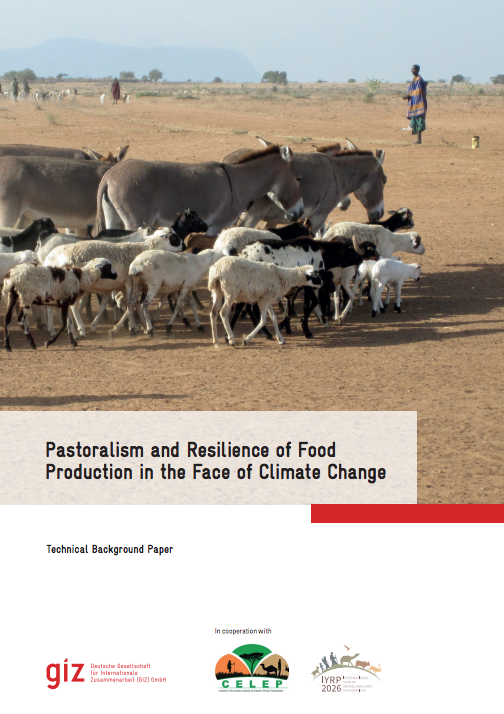

This guidebook aims to demonstrate the importance of sustainable soil management (SSM) for adaptation to climate change, biodiversity conservation and the achievement of long-term food security. By adopting nature-based solutions such as ecosystem-based adaptation (EbA), farmers can dramatically increase their productivity while adapting to climate risks.


FAKT Consult has developed and funded this paper to explore approaches and practices set out to support young people in rural areas to become productive members of rural societies. We believe this includes enabling young people to create a livelihood and generate a decent income which does not harm, but is in harmony with their environmental, material and social environment. We understand this paper as a “discussion paper” that may include controversial theses, to which we are inviting feedback for further discussion and elaboration of this paper. We also invite readers to contribute case studies and descriptions of approaches that have proven to be effective in promoting youth perspectives in rural areas.
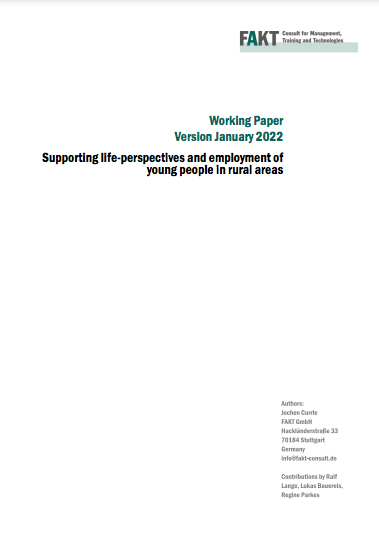

Brot für die Welt and their partner organizations in Southeast Asia and the Pacific decided to elaborate a study on good practices as part of a learning and exchange process on their land rights work. The overall goal was the documentation and exchange of good practices on land defense strategies contributing towards strengthening sustainable land rights of disadvantaged groups and land conflict transformation in Southeast Asia and the Pacific.
For this, Brot für die Welt partners working on land rights and land conflicts in Southeast Asia and the Pacific documented their experiences through reports and videos and discussed them in a series of online discourse. The process aimed at inspiring learning among each other and documenting practical experiences. The reports and videos present a broad range of approaches in land rights work, combining experience from development, peace building and human rights fields of action. The results of the individual videos and reports and of the online discourse are summarized in a synthesis report and video. The products are characterized by a high level of practical relevance. The link for the video ‘Sharing Good Practices in Land Rights Work’ can be accessed at https://www.brot-fuer-die-welt.de/en/bread-for-the-world/our-topics/land-grabbing/ , and the project documentation is available for download at https://www.brot-fuer-die-welt.de/fileadmin/mediapool/2_Downloads/Fachinformationen/Analyse/Analyse-104-en-v04.pdf or below on the FAKT homepage.


Fairtrade International commissioned a study to examine the impact of Fairtrade in regard to environmental protection, biodiversity conservation and adaptation to climate change. The study aimed to answer the following evaluation questions: How do Fairtrade (1) Standards and Tools, (2) Programs and Capacity Building, and (3) Premium investments impact on environmental protection, biodiversity conservation, and climate change adaptation/resilience.
FAKT carried out the global impact study combining quantitative methods for data analysis and qualitative methods for collecting results from different countries for the global study on the impacts of Fairtrade standards on adaptation to climate change, biodiversity and the environment with a particular focus on the impacts on women.
It took place worldwide with case studies in Latin America and the Caribbean (Panama, Costa Rica), Africa (Kenya) and the Middle East, and Asia and the Pacific (India).
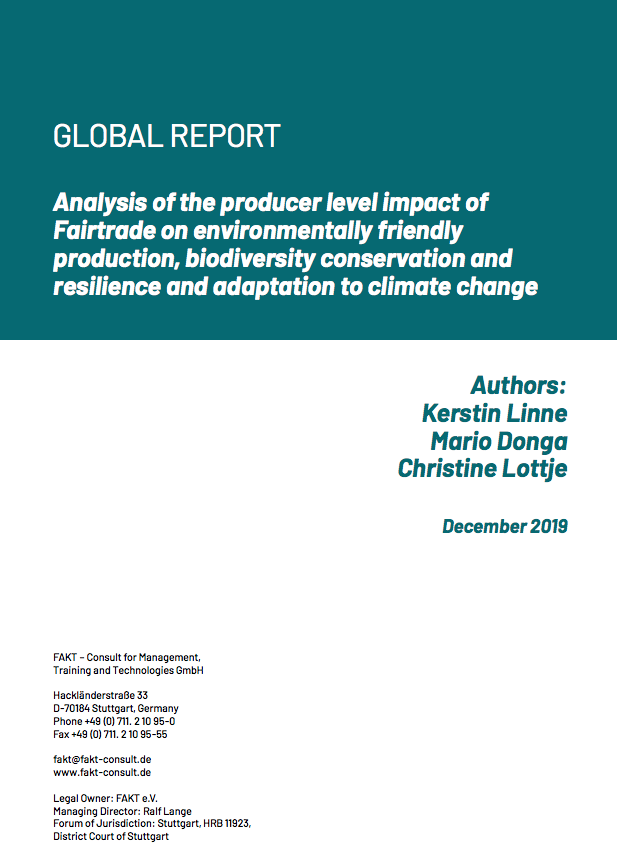

MISEREOR has been working with partner organisations for many years to promote agroecological development in Latin America by training local farmers as promoters. Promoters are selected from the communities and are considered ‘grassroots-level actors’ in their municipalities to engage in the joint elaboration of agroecological production and lifestyles. However, there are methodical and technical differences in the training of the various organisations. To date in most project proposals no methodical objectives exists.
MISEREOR ha estado trabajando durante muchos años con organizaciones socias para promover el desarrollo agroecológico en América Latina mediante la capacitación de agricultores locales como promotores. Los promotores son seleccionados de las comunidades y se consideran ‘actores a nivel de base’ en sus municipios para participar en la elaboración conjunta de la producción agroecológica y estilos de vida. Sin embargo, existen diferencias metodológicas y técnicas en la capacitación de las diversas organizaciones. Hasta la fecha, en la mayoría de las propuestas de proyectos no existen objetivos metodológicos.
Spanish publication:
- Papel, comprensión y eficacia del instrumento promotores y promotoras en la multiplicación de la agricultura sostenible en América Latina.
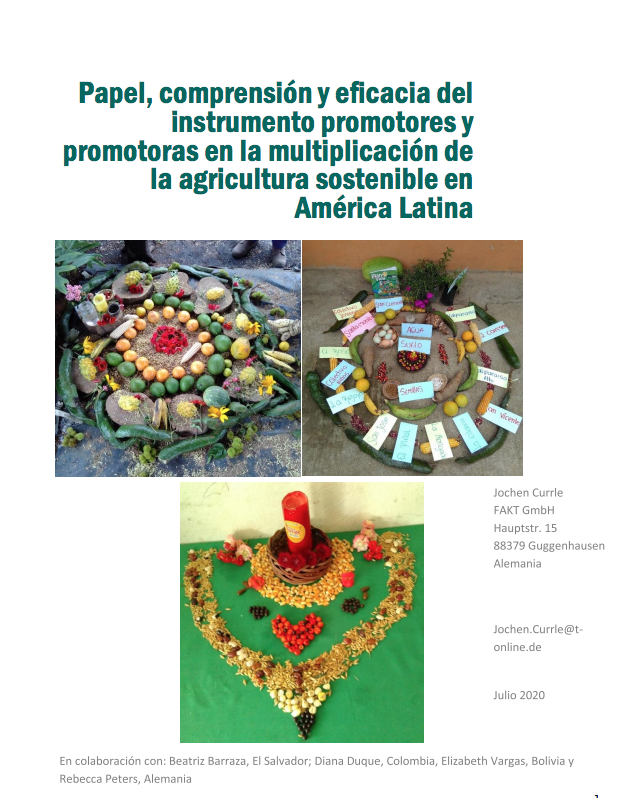
FAKT was tasked to collect and secure data on the methodical approach practised for the work with promoters and to examine the effectiveness of the instruments applied. An evaluation was carried out in 14 organisations from three countries in Central America and five countries in South America. For a more detailed study, five organisations were selected on the basis of the selection criteria ‘experience with the approach’, ‘specific characteristics’ and ‘geographical location’.
The main results of the study show that grassroot actors have high credibility in their environment and improve problem-solving capacity in collaboration with smallholder farmers. The continuous work with promoters shows positive influences in the local agrarian economy and favors the adoption of new practices in their collaborative work. In particular, the involvement of promoters in socially disrupted environments shows an improvement of social cohesion and identification. In the formation and during their practical engagement their personal and communication skills increase. This is reflected in increased personal initiative for cooperation in communities and advocacy for political interests in their regions. In addition, the attractiveness for engaging as a promotor is increasing within women (44-61% of all promoters contacted) and young people (30-50% of all promoters contacted). The study also highlights the importance of exchange platforms to foster exchange among MISEREOR partners and the need for an enhanced methodological reflection and training for promoters.


A practical guidance to the implementation of the Brot für die Welt policies.
Brot für die Welt has published its Policies on Food Security and Gender in 2018. This paper was elaborated to support the combined implementation of these policies. It aims to provide practical guidance on key strategic issues and intervention priorities to support food security and gender equality by its partner organizations.
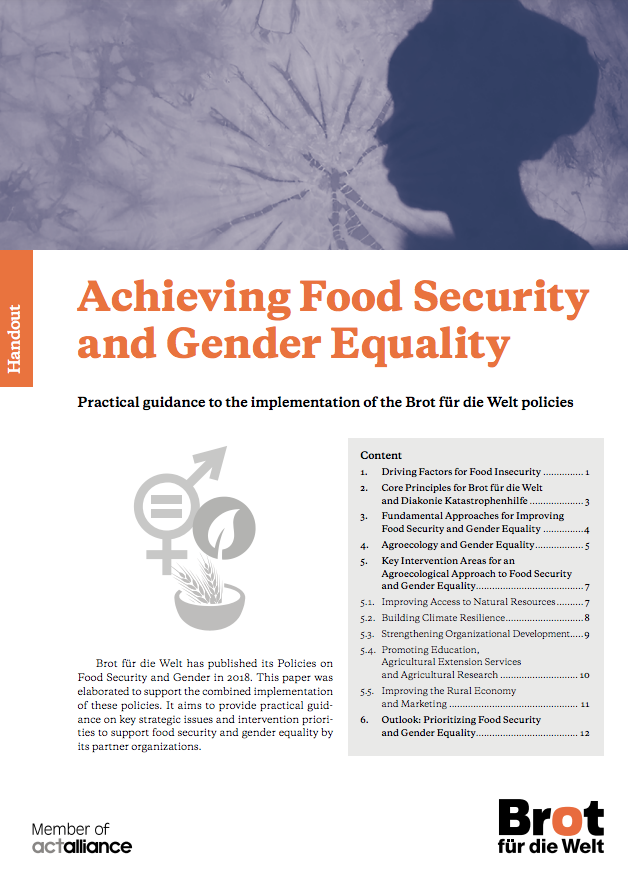

In November 2018, FAKT supported the Swiss NGO DRR Platform by facilitating the annual Face-tp-Face event on “Local evidence for disaster and climate resilient pathways – an advocacy journey”. In collaboration with the Global Network of Civil Society Organizations for Disaster Reduction (GNDR) a packing list was developed based on the workshop results. It aims to provide CCA and DRR pracititioners with a simple guide for planning successful advocacy.


Der Klimawandel verursacht zunehmende soziale und ökonomische Schäden, die insbesondere den Ländern des globalen Südens hohe, zusätzliche Anpassungsleistungen abverlangen und die Umsetzung von Entwicklungszielen erschweren. Diese Studie analysiert , welche Anforderungen an die nationalen Anpassungspläne sich aus dem Rahmenübereinkommen der Vereinten Nationen über Klimaänderungen (UNFCCC) mit Blick auf Vulnerabilität und Partizipation ergeben. In einem zweiten Schritt wird diskutiert, wie sich der Leitfaden des BMZ zur Berücksichtigung menschenrechtlicher Standards und Prinzipien für die Entwicklungszusammenarbeit auf die NAP-Prozesse anwenden lässt. Darauf aufbauend wird sodann untersucht, inwiefern in den Leitlinien, Instrumenten und Schulungsmaßnahmen wichtiger Akteure im bisherigen NAP-Prozess die Faktoren „zivilgesellschaftliche Partizipation” und „Fokus auf besonders vulnerable Bevölkerungsgruppen” Berücksichtigung finden.
Publication Bread for the World, Analysis 62, Fact check on climate policy:
Climate change is causing increasing social and economic damage, which demands high additional adaptation efforts, particularly from the countries of the Global South, and makes it more difficult to realise development goals. This study analyses the requirements for national adaptation plans arising from the United Nations Framework Convention on Climate Change (UNFCCC) with regard to vulnerability and participation. In a second step, it discusses how the BMZ’s guideline on the consideration of human rights standards and principles for development cooperation can be applied to the NAP processes. Building on this, the extent to which the factors of ‘civil society participation’ and ‘focus on particularly vulnerable population groups’ are taken into account in the guidelines, instruments and training measures of important actors in the NAP process to date will then be analysed.
German publication:
- Klimapolitik im Faktencheck
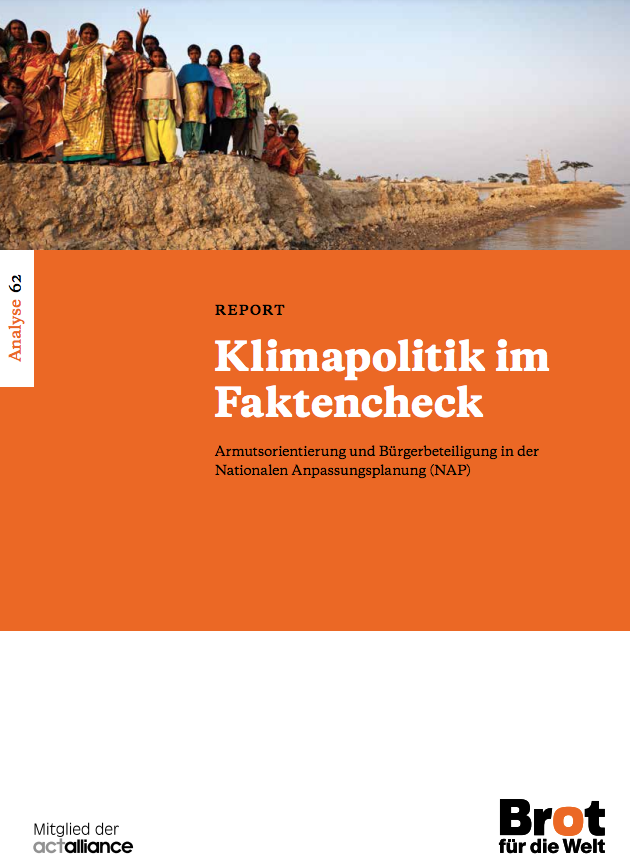

FAKT führte auf Fidschi einen Workshop zu Community Mapping durch. Partizipative Kartographie basiert auf dem Prinzip, dass lokale Gruppen oder Gemeinden mit ihren Ortserfahrungen die sozialen und ökologischen Gegebenheiten aus ihrer Perspektive kartographisch darstellen. Solche Karten sind für Advocacy- und Öffentlichkeitsarbeit ein wichtiges Kommunikationsmittel und dienen als Grundlage, um rechtliche Fragestellungen anzugehen sowie Lösungsprozesse anzustoßen.
FAKT conducted a workshop on community mapping in Fiji. Participatory mapping is based on the principle that local groups or communities use their experiences of their locality to cartographically represent social and environmental conditions from their perspective. Such maps are an important communication tool for advocacy and public relations work and serve as a basis for addressing legal issues and initiating solution processes.
German article:
- Misereor: Stärkung der Zivilgesellschaft auf Fidschi (FriEnt Impulse 07-08, 2016, page 5-6)
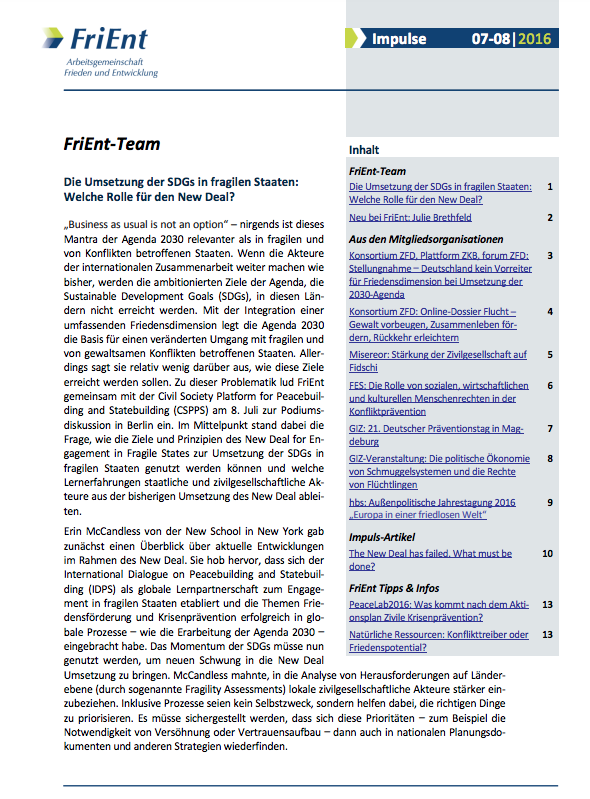

Over the course of two years, FAKT could support the NGO “Menschen für Menschen” with expertise on impact based monitoring and evaluation approaches. Three active projects for integrated rural development have been evaluated and a sustainability study could be performed in a region where project activities have been closed down five years ago.
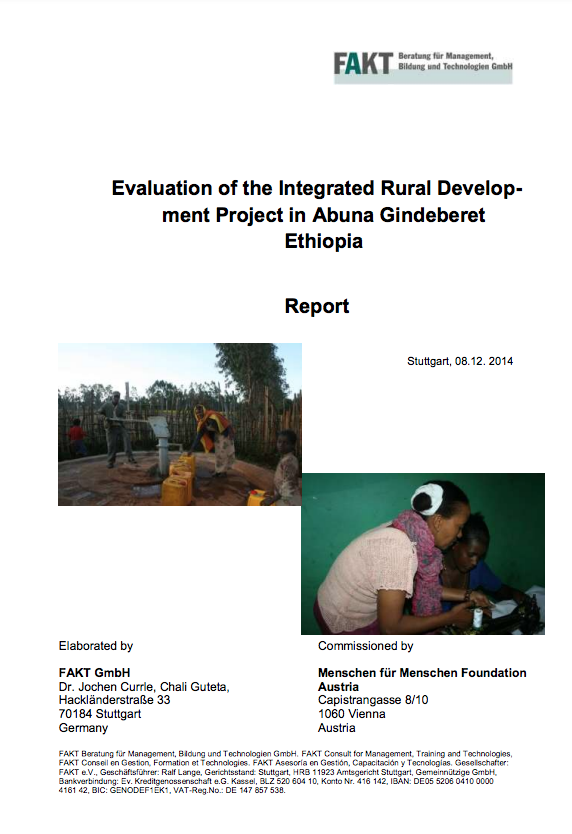
“The Menschen für Menschen” Foundation (MfM) is working in Ethiopia’s’ rural regions since some 30 years. It started its activities with relief work in 1981, broadening and solidifying its efforts during its first decade into an integrated development approach. Today MfM runs 11 integrated rural development projects in different parts of Ethiopia with an annual budget of roughly 20 million Euro. These integrated rural development projects usually provide a comprehensive support to the region, addressing productive, social, economic and ecological sectors at the same time, in order to support an all including development of the regions to work with.
Since 2013 MfM is building up its impact based monitoring and evaluation capacities with the help of FAKT experts. Together with Ethiopian colleagues we designed a result based monitoring system for all 11 active project regions, which is implemented presently with the support of a FAKT trained Ethiopian consultant.
Three of the running integrated rural development projects in Borena, Gindeberet and Abuna Gindeberet have been evaluated by FAKT consultant-teams. The teams could confirm that project implementation, results and reactions of the beneficiaries showed “that project management lives up to the claim of conducting an integrated project”. In spite of minor shortfalls it could be concluded that MfM’s activities were dearly relevant for the regions, that envisaged objectives could be reached at reasonable costs and that the activities of MfM brought a positive perspective and motivation to a majority of the rural dwellers.
An ex-post evaluation in the Merhabete district that focused on the sustainability of MfM induced changes in infrastructure, agricultural practices, institutional capacity and the attitudes of the people after five years of project close-down as well showed interesting results. Positive development in all sectors MfM had been working continued impressively after the projects leave. One example for this are the introduction of mango and vegetable cultivation, rarely known before the project and now widely practiced by the farm households, enriching their diet and providing income to cover household costs without being forced to sell the highly valued staple food “teff”. Another, even more surprising long-term development is the change of the social norm to marry girls at a very young age, thus preventing them to get school education, contributing to chronic female diseases and to very high birth rates. The combined effects of a more secure economic situation of the families, of easier reachable schools and of specific income opportunities for women lead to a stable change in social norms allowing girls nowadays to a far higher extend to develop their capacities.


MISEREOR’s partners in Africa, Asia, and Latin America are tackling the negative impacts of resource extraction, advocating for fair and sustainable practices that benefit local communities. The rising demand for resources has led to increased interest in deep-sea mining in the Pacific, despite its potential environmental and social risks. Misereor has published a discussion paper on this topic, which was prepared by Axel Müller, FAKT.
English publication:
- MISEREOR publication on Deep Seabed Mining and its social and ecological risks: “Deep Seabed Mining – Treasure chest or another Pandora’s box? In focus: the Pacific”.
German publication:
- Publikation von MISEREOR zum Thema Tiefseebergbau und die sozialen und ökologischen Risiken : “Tiefseebergbau – Unkalkulierbares Risiko für Mensch und Natur. Im Fokus – der Pazifik”.
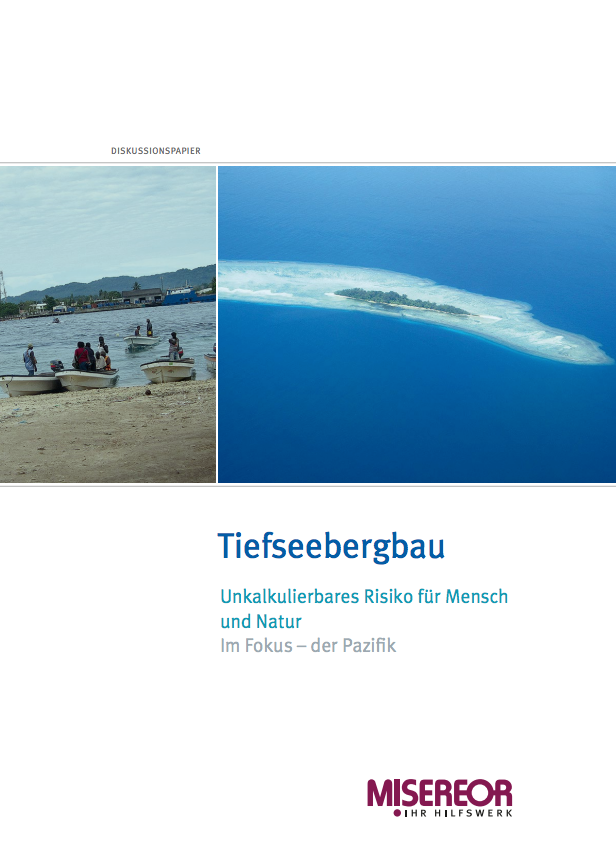

Was bedeutet Fairer Handel wirklich? Aktuelle Entwicklungen und Siegel im Fairen Handel verstehen (Brot für die Welt Aktuell 43), verfasst von Christine Lottje, FAKT, und herausgegeben von Brot für die Welt, bietet einen Überblick über die wichtigsten Zertifizierungen und aktuellen Trends im Fairen Handel.
What does Fair Trade really mean? Understanding current developments and labels in Fair Trade (Brot für die Welt Aktuell 43), designed by Christine Lottje (FAKT) and published by Bread for the World, offers an overview of the most important certification marks and current trends in Fair Trade.
German publication:
- Was bedeutet Fairer Handel wirklich? Aktuelle Entwicklungen und Siegel im Fairen Handel verstehen.
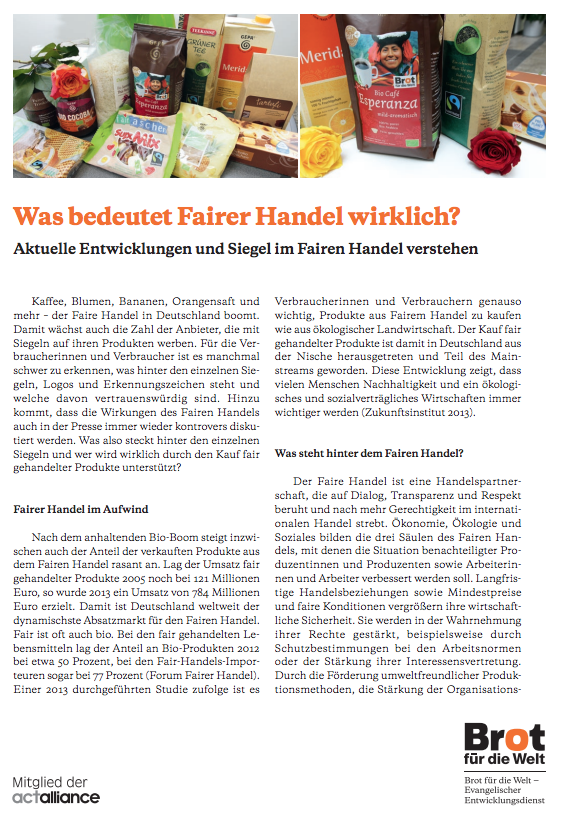

Klimaschutz in der Land(wirt)schaft – Chancen und Risiken für Kleinbauern in Entwicklungsländern, verfasst von Christine Lottje (FAKT), Marcus Kaplan (DIE), Anika Schroeder (MISEREOR) und Karl Schüle (Brot für die Welt). Die Publikation dokumentiert die Ergebnisse eines Expertengesprächs, das im Februar 2014 in Bonn stattfand.
Climate protection in agriculture – opportunities and risks for small farmers in developing countries (German version), designed by Christine Lottje (FAKT), Marcus Kaplan (DIE), Anika Schroeder (MISEREOR) and Karl Schüle (Brot für die Welt). The publication documents the results of an expert discussion held in Bonn in February 2014.
German publication:
- Klimaschutz in der Land(wirt)schaft – Chancen und Risiken für Kleinbauern in Entwicklungsländer
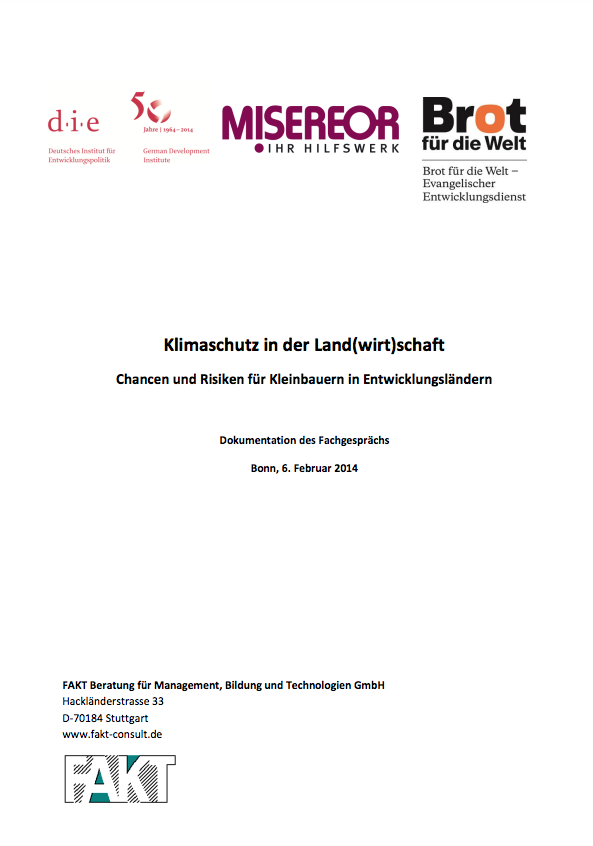

On behalf of Brot für die Welt, Franziska Krisch of FAKT developed a manual for planning, monitoring and evaluation. The manual has been published by Diakonisches Werk der EKD e.V. for Brot für die Welt and is available for download in three languages.
English publication:
- Guidelines for impact orientation of advocacy
Spanish publication:
- Orientación a los impactos de abogacía
German publication:
- Wirkungsorientierung von Advocacy
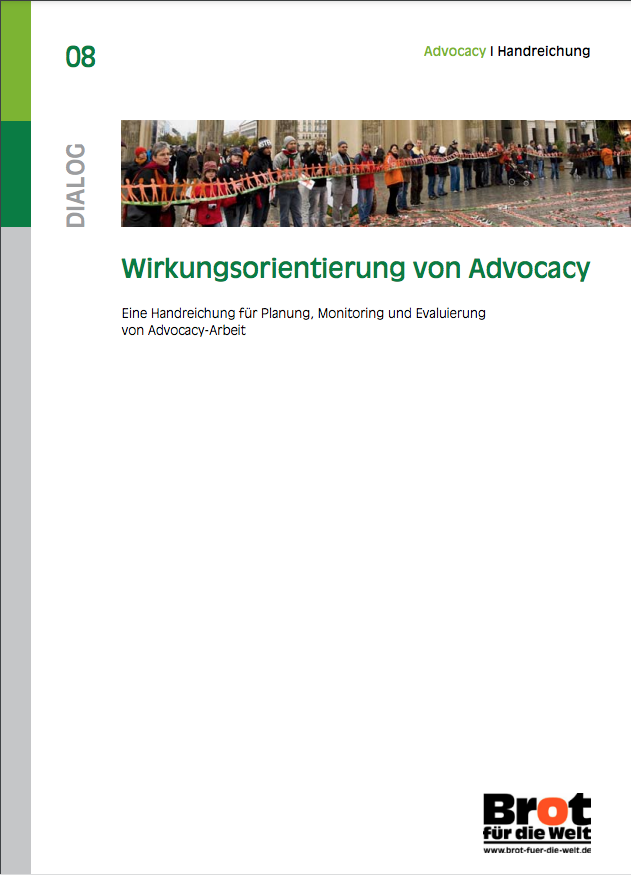

On behalf of GIZ and the Training Programme for Iraqi Professionals in Egypt (TRIP) Dorsi German of FAKT together with Eva Castañer, in cooperation with the publishing firm Warenform, designed a new manual on monitoring and evaluation. The manual is aiming at practitioners in the sectors of area of Vocational Education and Training but can as well be useful for development actors in other fields.
English publication:
- Monitoring and evaluation for TVET-related development interventions
Arabic publication:
- الرصد والتقييم للتدخلات التنموية المتعلقة بالتعليم والتدريب التقني والمهني (TVET)
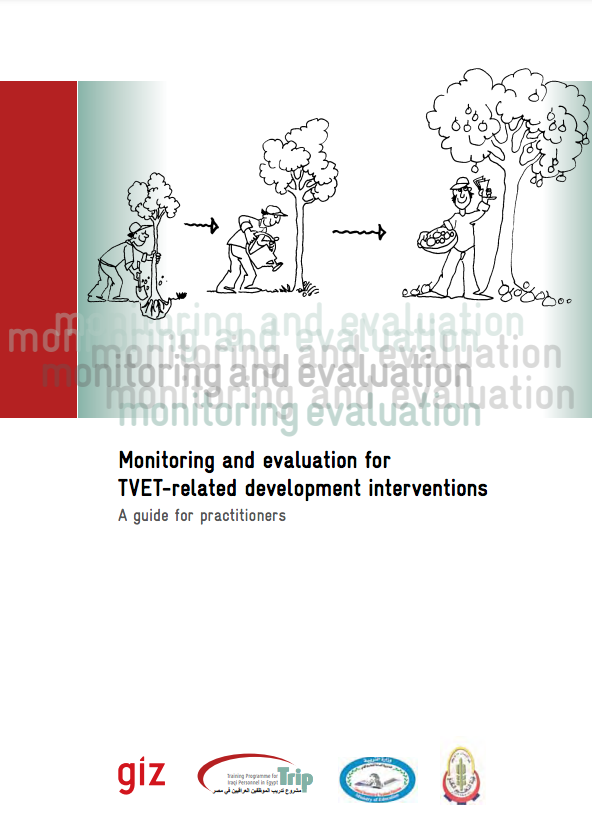

Handreichung zu Wirkungen und wirkungsorientiertes Monitoring von Beiträgen Beruflicher Bildung und Beschäftigungsförderung zu sozialer (Re-)Integration in (Post-)Konfliktsituationen, designed by Ralf Lange, FAKT, Ursula Reich, Martina Rithaa, Julia Giebeler and published by Deutsche Gesellschaft für Internationale Zusammenarbeit (GIZ).
Die vorliegende Handreichung dient als Arbeitsdokument. In ihr werden der Kontext und theoretische Grundlagen beschrieben sowie Erfahrungen und Herausforderungen des Wirkungsorientierten Monitorings aufgezeigt. Im Kern der Handreichung werden Wirkungshypothesen, beispielhafte Indikatoren und Methoden der Wirkungserhebung dargestellt. Zudem werden praktische Hinweise für die Erhebung von Baseline Daten gegeben.
Handout on impacts and impact-oriented monitoring of contributions of vocational education and training and employment promotion to social (re-)integration in (post-)conflict situations(German version), designed by Ralf Lange, FAKT, Ursula Reich, Martina Rithaa, Julia Giebeler and published by Deutsche Gesellschaft für Internationale Zusammenarbeit (GIZ).
This handout serves as a working document. It describes the context and theoretical foundations as well as the experiences and challenges of impact-oriented monitoring. The handout focuses on impact hypotheses and presents exemplary indicators and methods of impact measurement. It also provides practical tips for collecting baseline data.
German publication:
- Wirkungen und wirkungsorientiertes Monitoring von Beiträgen Beruflicher Bildung und Beschäftigungsförderung zu sozialer (Re-)Integration in (Post-)Konfliktsituationen
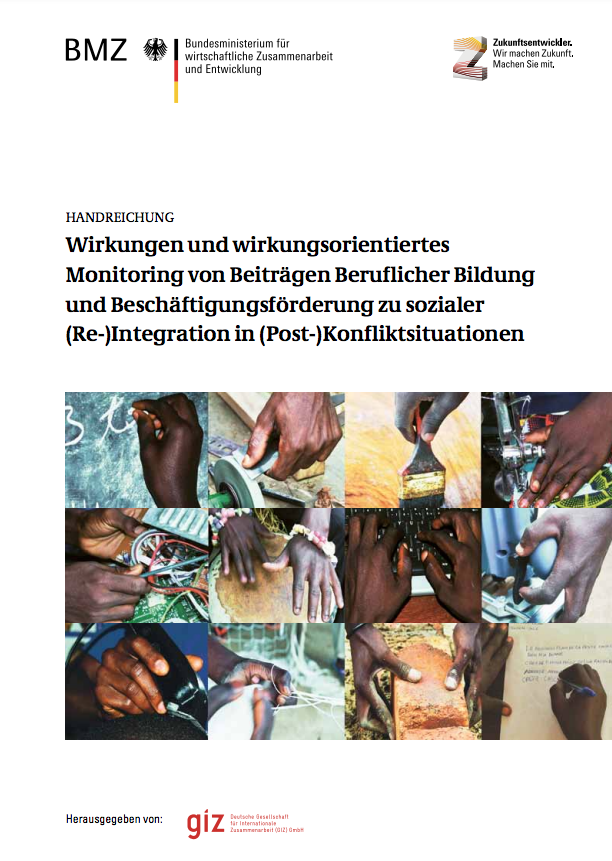

Tracer studies are working instruments to measure the relevance of vocational training. The manual has been designed by Ralf Lange, FAKT. An English version is available and can be downloaded (PDF file).
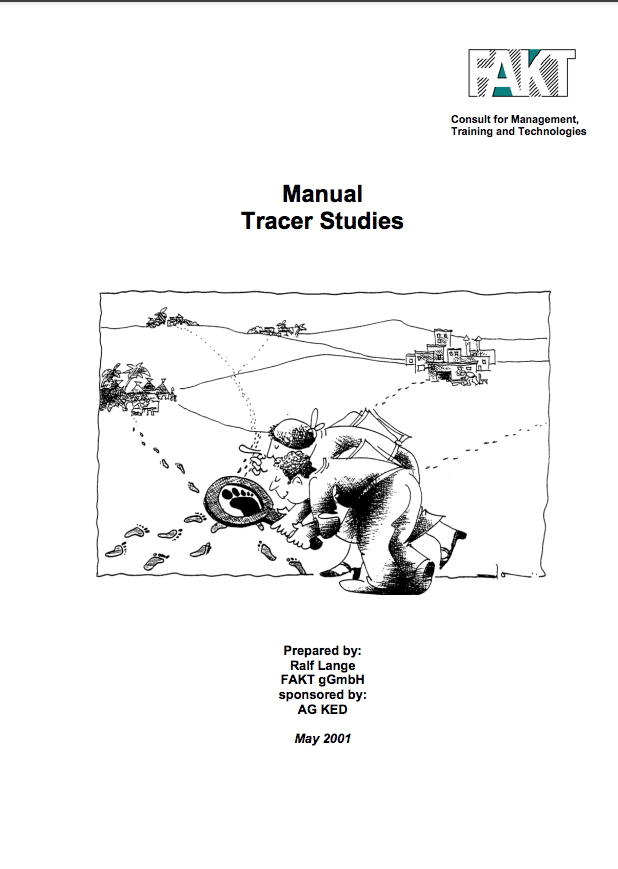

Evaluators, process consultants and development practitioners alike need to get essential information within a short period of time. In many assignments they also need genuine information from communities. The Tiny Tools are quick participatory tools to find out more about outcomes and impact together with communities. Impact Plus has developed the tools in cooperation with some 50 NGOs on three continents in a contract with NGO-IDEAs and VENRO, the umbrella of German development NGOs.
English publications on Tiny Tools:
- Guide to lifeline /quality of life curve
- Guide to trend analysis
- Guide to activity list
- Guide to influence matrix
Les évaluateurs, les consultants en processus et les praticiens du développement ont tous besoin d’obtenir des informations essentielles en un court laps de temps. Dans de nombreuses missions, ils ont également besoin d’informations authentiques provenant des communautés. Les Tiny Tools sont des outils participatifs rapides permettant d’en savoir plus sur les résultats et les impacts en collaboration avec les communautés. Impact Plus a développé ces outils en coopération avec une cinquantaine d’ONG sur trois continents dans le cadre d’un contrat avec NGO-IDEAs et VENRO, la fédération des ONG de développement allemandes.
Publications françaises sur les petits outils :
- Petits outils ligne de vie
- Petits outils analyse de tendance
- Petits outils liste d’activités
- Petits outils matrice d’influence
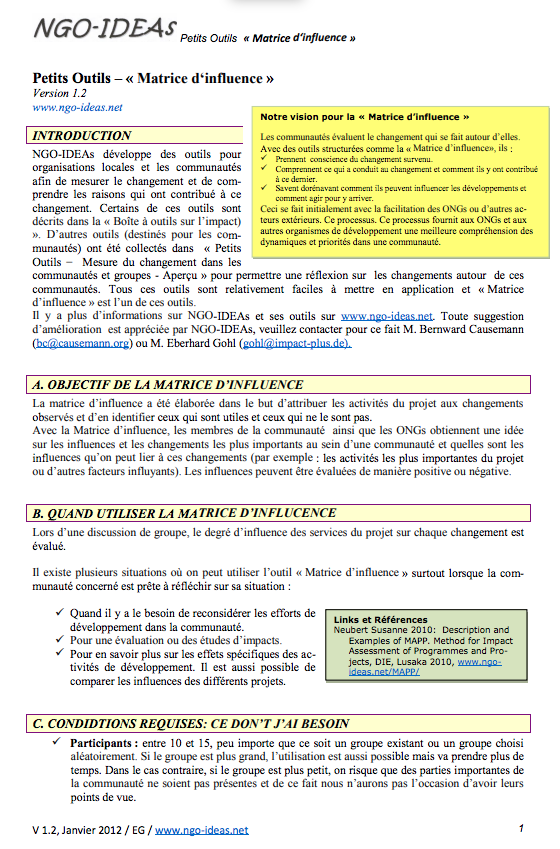
Tiny Tools are relatively simple and quick (“tiny”) instruments for group discussion modelled on Participatory Rural Appraisal. Experi-ence shows that these tools increase the process use of consultancies. They lead to new in-sights, mobilise enthusiasm and increase the capacity of communities to bring about further change. They also produce genuine and reliable information for appraisals and evaluation. All combine qualitative and quantitative elements. They generate numbers and narratives.
- Lifeline: In Lifeline participants rate past years on a scale from 1 to 5. This gives a graphic idea of how life changed, and generates narratives about the major development influences.
- Trend Analysis: Trend Analysis rates specific aspects of life over the past years. It shows how different elements of people’s reality change in different ways.
- Activity List: With Activity List communities compare the significance and effectiveness of different activities or projects. The tool generates information about the relative importance and work load of development interventions.
- Influence Matrix: The influence matrix looks both at the change and at the causes for change. The influence of different development interventions on aspects of life is visualised and evaluated.
MAPP
Tiny Tools have their origin in MAPP (Method for Impact Assessment of Projects and Programmes). MAPP combines a number of Participatory Rural Appraisal tools. It explores both changes and causes of change in a community in a very detailed way. It has been frequently used to evaluate NGO, as well as large government programmes, see www.ngo-ideas.net/MAPP .
FAKT has done many studies to the satisfaction of donors and project staff, using MAPP or single Tiny Tools. For a published example of using Trend Analysis in a sector study, see Report “Rural Development Sector Evaluation” http://www.misereor.org/en/cooperation-and-service/evaluation.html. For an overview of more Tiny Tools, see www.ngo-ideas.net/tiny_tools .
Impact Plus has developed the set of tools in cooperation with some 50 NGOs on three continents in a contract with NGO-IDEAs and VENRO, the umbrella of German development NGOs. FAKT associated consultants Eberhard Gohl and Bernward Causemann led the NGO-IDEAs project and developed the Tiny Tools with partners, partly taking them from existing tools (especially MAPP), partly developing new ones.


Participatory Impact Monitoring has been developed with GATE/GTZ to promote community based monitoring of change. The Booklets are available in English, Spanish, French, Portuguese and Brazilian.
The booklets on Participatory Impact Monitoring (PIM) have been designed by Dorsi Germann and Eberhard Gohl and published by Deutsches Zentrum für Entwicklungstechnologien – GATE / Gesellschaft für Technische Zusammenarbeit (GTZ) . There are four booklets on PIM available (downloads/PDF files) in the following versions:
English publications on PIM:
- PIM Booklet 1: Group-based impact monitoring
- PIM Booklet 2: NGO-based impact monitoring
- PIM Booklet 3: Applications examples
- PIM Booklet 4: The concept of participatory impact monitoring
Le Suivi Participatif de’Impact (PIM) a été développé avec GATE/GTZ pour promouvoir le suivi du changement au niveau communautaire.
Publications françaises sur le PIM :
- Fascicule 1: Le suivi d’impact pour les groupes
- Fascicule 2: Le suivi d’impact pour les ONG
El Monitoreo Participativo del Impactos (PIM) ha sido desarrollado con GATE/GTZ para promover el monitoreo del cambio basado en la comunidad. Los folletos están disponibles en inglés, español, francés, portugués y brasileño.
Publicaciones españolas sobre PIM:
- Folleto 1: Monitoreo de impactos a través del grupo de base
- Folleto 2: Monitoreo de impactos a través de la ONG
A Monitorização Participativa do Impacto (PIM) foi desenvolvida com o GATE/GTZ para promover a monitorização da mudança com base na comunidade. Os folhetos estão disponíveis em inglês, espanhol, francês, português e brasileiro.
Publicações portuguesas sobre PIM:
- Caderno 1: Monitorização do Impacto através de Grupos
- Caderno 2: Monitorização do Impacto na ONG de Base
- Caderno 3: Exemplos de Aplicação
O Monitoramento Participativo de Impactos (PIM) foi desenvolvido com a GATE/GTZ para promover o monitoramento de mudanças com base na comunidade. Os livretos estão disponíveis em inglês, espanhol, francês, português e brasileiro.
Publicação em português do Brasil sobre o PIM:
- Cartilha 1: Monitoramento de Impactos através de Grupos
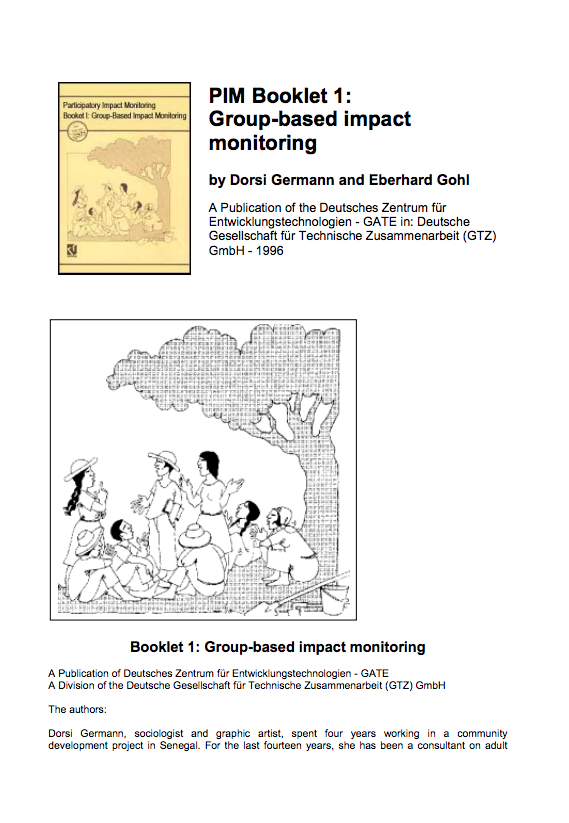

Coworkers wanted to know more about the effects of the Covid-19 pandemic on seconding development workers abroad. FAKT collected data among development workers and partner organisations on four continents. The relevance of development workers increased during the pandemic. Many assisted partner organisations on a strategic level to undergo transformation processes.
FAKT conducted an ex-post impact analysis of environmental projects on the Balkans, commissioned by the Austrian Development Agency ADA. 37 projects were analysed. In field studies in Albania, Kosovo and Macedonia, the participatory tool MAPP was used to assess change and attribution.
The first impact oriented sector evaluation for EED, a predecessor to Bread for the World on a global level. It assessed EED’s intervention on rural development, evaluating 88 EED funded projects and conducting five case studies in different countries. Amongst other tools and a quantitative study, the participatory tool MAPP was carried out.
The first impact oriented sector evaluation for Misereor on global level. More than 200 Misereor projects were analysed in a desk study. Nine case studies in different countries were carried out, partly based on Participatory Rural Appraisal tools that are suitable to assess impact (“Tiny Tools“).